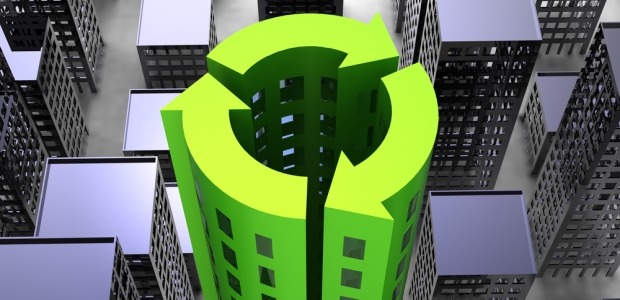
Better Financing Options Make Green Multifamily Development Affordable
Through Fannie Mae, green financing allows borrowers to fund smart, energy-efficient improvements or reward investments for refinance, acquisition, or supplemental financing. These programs are the first of their kind available to not only affordable, but also market-rate multifamily properties.
- By Katie Plett
- May 03, 2016
Green building has been growing in popularity for more than a decade, but its rise as a multifamily option has been delayed by the fact that many assume green building meant spending more money. Thankfully, it's not true anymore.
Consumer desire and demand for sustainable living, driven by millennials, has begun to increase rents in eco-centric buildings. The price of sustainable materials and technologies is continuing to decrease. More importantly, there are now more options for financing green projects, making it easier than ever for builders and owners to reduce costs, interest, and fees and add long-term value to their properties.
Builders, architects, and designers no longer have to dismiss the idea of larger-scale projects that incorporate systems such as rainwater collections, solar panels, or green roofing simply because they're not in the budget.
For the past 15 years, sustainability has become more of a norm. Consumers are buying more hybrid and electric vehicles, shopping with reusable shopping bags, and dividing their garbage into recyclables, biodegradables, and regular trash. As living green becomes more commonplace, developers and existing owners are facing educated buyers with expectations of eco-friendly features. This is true of buyers of residential homes and renters and buyers in the commercial real estate market.
Green financing options and green building certifications have increased to cater to these needs, but their availability isn't yet common knowledge. In the past, many building codes did not require any sort of green standard, making it difficult to propose unique green designs to developers assuming an increased cost.
The global green-building market was a booming $260 billion in 2013, with a 12.81 percent increase in 2014. With local and national municipalities widely accepting challenges, such as the "2030 Challenge," and broader international recognition of global climate change, the industry is expected to continue this trend through 2020 and beyond, with consistent increases in usage and demand.
Two leading voluntary certification programs, LEED and ENERGY STAR, have set performance expectations on a national and global level. In the United States alone, there are 1.5 billion square feet of LEED-certified space and 2.5 billion square feet of ENERGY STAR-certified commercial space. Beyond the long-term savings on operating expenses and increased revenue that comes with green building, green financing provides additional incentives through lower interest rates and sometimes higher loan proceeds.
Green Building Certification and Green Rewards
In 2015, Fannie Mae launched two Green Financing Products for multifamily properties—Green Building Certification and Green Rewards. These two programs encourage efficient and eco-friendly building and incentivize owners of older buildings to make green improvements.
The first project funded in the Northwest (second nationally) with Fannie Mae's Green Building Certification program was a $3.8 million multifamily complex called The Woodlawn. Built by Northwest green-developer SolTerra in Portland, Ore., it received LEED Platinum certification for its many eco-friendly features, including a 9,000-gallon rainwater cistern, efficient water fixtures, solar panels, and an "eco roof" to better manage stormwater runoff and reduce overflow into the street.
When SolTerra went looking for financing, the company turned to HomeStreet Bank Commercial Real Estate. HomeStreet, a Delegated Underwriter and Servicer (DUS) of Fannie Mae, was able to save SolTerra $110,000 in interest over a 10-year loan term via the Green Building Certification Pricing Break. Those savings will allow SolTerra to pay back the LEED certification cost in less than five years.
The Green Rewards Program requires property owners to commit to improvements that are projected to reduce the property's annual energy or water usage by 15-20 percent, with varying benefits for each segment. A portion of the expense savings can be added to the net operating income, thus increasing the loan proceeds available. In addition, the property also receives a lower interest rate.
Through Fannie Mae, green financing allows borrowers to fund smart, energy-efficient improvements or reward investments for refinance, acquisition, or supplemental financing. These programs are the first of their kind available to not only affordable, but also market-rate multifamily properties.
The availability of these programs highlights that the benefits of building green go beyond just lower energy bills. Increases in resale value, lower operating expenses, and higher occupancy rates are just a few of the ways builders are justifying green designs into their plans.
According to the U.S. Green Building Council, 41 percent of all nonresidential building starts in 2012 were green, as compared to 2 percent of all nonresidential building starts in 2005. This trend is set to change the landscape and even cityscapes of communities to come.
The newest asset valuation tool may just be energy performance.
About the Author
Katie Plett is HomeStreet Commercial Real Estate's vice president and relationship manager. Since joining HomeStreet Commercial Real Estate in 2011, Katie has originated over $300 million in Fannie Mae DUS®, Construction, Bridge and Permanent financing. She enjoys the flexibility HomeStreet's products provide to help find creative financing solutions to the market place’s ever-increasing demands. She is also actively serving as a Lender representative on Fannie Mae's Green Housing Task Force. Visit https://www.homestreet.com/ for information. DUS® is a registered trademark of Fannie Mae. HomeStreet, Inc. is a diversified financial services company headquartered in Seattle, serving consumers and businesses in the western United States and Hawaii through its various operating subsidiaries. The company is principally engaged in real estate lending, including mortgage banking activities, and commercial and consumer banking. Its principal subsidiaries are HomeStreet Bank and HomeStreet Capital Corporation.